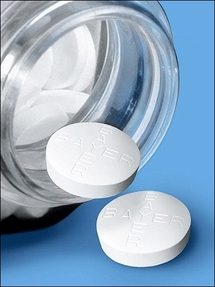
Taking similar levels of a non-steroidal anti-inflammatory drug (NSAID) such as ibuprofen reduced the figures by 32 percent, according to the study published in the British Journal of Cancer.
Protection against cancer increased with the dosage of painkiller taken, it found.
"We found that the risk of non-cardia (middle and lower) stomach cancer was lower in people who had taken aspirin, and this risk lowered the more regularly they took it," said Christian Abnet of the US National Cancer Institute.
"Interestingly, our results didn't show a significant cut in the risk of oesophageal or cardia (upper) stomach cancer, so it's important that we continue to review data that suggests otherwise," she added.
But Lesley Walker of Cancer Research UK warned that it was premature to make blanket recommendations. "It's far too early to recommend that people take aspirin to protect themselves from these cancers.
"In cancers where survival is low, understanding how to prevent the disease is crucial, but more research is needed to discover how side effects can be balanced with the benefits.
"Cancer Research UK would urge people to speak to their doctor before taking aspirin regularly," she said.
Abnet added: "The number of people who survive at least five years following a diagnosis of stomach or oesophageal cancer is low, so it's important to increase our understanding of ways to prevent the disease and to investigate aspirin as a possible preventative drug."
--------------------------------------------
Image of pills, from AFP.
Protection against cancer increased with the dosage of painkiller taken, it found.
"We found that the risk of non-cardia (middle and lower) stomach cancer was lower in people who had taken aspirin, and this risk lowered the more regularly they took it," said Christian Abnet of the US National Cancer Institute.
"Interestingly, our results didn't show a significant cut in the risk of oesophageal or cardia (upper) stomach cancer, so it's important that we continue to review data that suggests otherwise," she added.
But Lesley Walker of Cancer Research UK warned that it was premature to make blanket recommendations. "It's far too early to recommend that people take aspirin to protect themselves from these cancers.
"In cancers where survival is low, understanding how to prevent the disease is crucial, but more research is needed to discover how side effects can be balanced with the benefits.
"Cancer Research UK would urge people to speak to their doctor before taking aspirin regularly," she said.
Abnet added: "The number of people who survive at least five years following a diagnosis of stomach or oesophageal cancer is low, so it's important to increase our understanding of ways to prevent the disease and to investigate aspirin as a possible preventative drug."
--------------------------------------------
Image of pills, from AFP.









 Home
Home Politics
Politics









